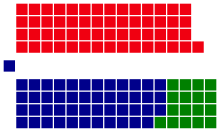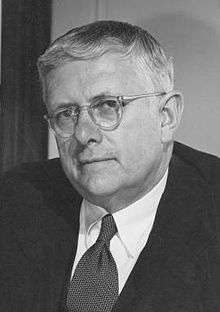Australian federal election, 1954
| ||||||||||||||||||||||||||||||||||
All 121 seats of the Australian House of Representatives 61 seats were needed for a majority | ||||||||||||||||||||||||||||||||||
| ||||||||||||||||||||||||||||||||||
| ||||||||||||||||||||||||||||||||||
Federal elections were held in Australia on 29 May 1954. All 121 seats in the House of Representatives were up for election, no Senate election took place. The incumbent Liberal Party of Australia led by Prime Minister of Australia Robert Menzies with coalition partner the Country Party led by Arthur Fadden defeated the Australian Labor Party led by Herbert Evatt.
Results

| Party | Votes | % | Swing | Seats | Change | Notes | |
|---|---|---|---|---|---|---|---|
| Australian Labor Party | 2,280,098 | 50.03 | +2.40 | 57 | +5 | (1 elected unopposed) | |
| Liberal Party of Australia | 1,745,808 | 38.31 | −2.31 | 47 | −5 | (3 elected unopposed) | |
| Country Party | 388,171 | 8.52 | −1.20 | 17 | 0 | (3 elected unopposed) | |
| Other | 143,211 | 3.14 | 0 | 0 | |||
| Total | 4,557,288 | 121 | |||||
| Liberal/Country coalition | WIN | 49.30 | −1.40 | 64 | −5 | ||
| Australian Labor Party | 50.70 | +1.40 | 57 | +5 | |||
See Australian Senate election, 1953 for Senate composition.
Seats changing hands
| Seat | Pre-1954 | Swing | Post-1954 | ||||||
|---|---|---|---|---|---|---|---|---|---|
| Party | Member | Margin | Margin | Member | Party | ||||
| Bass, Tas | Liberal | Bruce Kekwick | 3.4 | 4.4 | 1.0 | Lance Barnard | Labor | ||
| Flinders, Vic | Labor | Keith Ewert | 5.1 | 4.3 | 1.6 | Robert Lindsay | Liberal | ||
| Griffith, Qld | Liberal | Doug Berry | 3.7 | 4.1 | 0.4 | Wilfred Coutts | Labor | ||
| St George, NSW | Liberal | Bill Graham | 1.6 | 4.3 | 2.7 | Nelson Lemmon | Labor | ||
| Sturt, SA | Liberal | Keith Wilson | 2.4 | 5.4 | 3.0 | Norman Makin | Labor | ||
| Swan, WA | Liberal | Bill Grayden | 3.3 | 4.9 | 1.6 | Harry Webb | Labor | ||
History
In 1949, Sir Robert Menzies founded the Liberal Party of Australia (descended from the United Australia Party) and was led by Menzies for 16 years through successive re-elections with the traditional coalition in place with the National Party of Australia (known then as the Country Party). Labor stayed out of government for 23 years after the defeat of the Chifley Government in 1949, largely due to the Australian Labor Party split of 1955 and the subsequent splinter group Democratic Labor Party. Labor nevertheless won the two-party-preferred vote on three occasions (1954 - where Labor achieved a first preference vote of more than 50% - 1961 and 1969), but these were not enough to win a sufficient number of seats to form government.
The election was complicated by the Petrov Affair, in which Vladimir Petrov, an attache to the Soviet embassy in Canberra, defected amidst a storm of publicity, claiming that there were Soviet spy rings within Australia. Given that the 1951 election had been fought over the issue of banning the Communist Party of Australia altogether, it is unsurprising that such a claim would gain credibility.
The 20th session of the Parliament of the Commonwealth of Australia was officially opened by Her Majesty Queen Elizabeth II, Queen of Australia. This was the first time a reigning monarch had opened a session of parliament in Australia. Her Majesty wore her Coronation Dress to open the 20th session of parliament.
See also
- Candidates of the Australian federal election, 1954
- Members of the Australian House of Representatives, 1954–1955
References
- University of WA election results in Australia since 1890
- AEC 2PP vote
- Prior to 1984 the AEC did not undertake a full distribution of preferences for statistical purposes. The stored ballot papers for the 1983 election were put through this process prior to their destruction. Therefore, the figures from 1983 onwards show the actual result based on full distribution of preferences.

